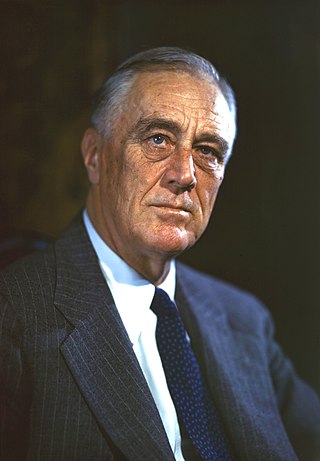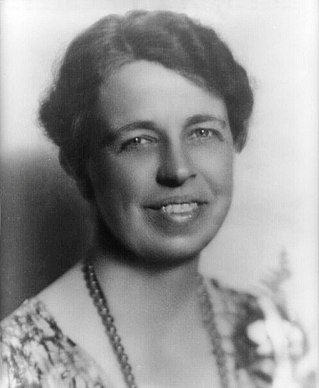Related Research Articles

Franklin Delano Roosevelt, commonly known as FDR, was an American statesman and politician who served as the 32nd president of the United States from 1933 until his death in 1945. Roosevelt directed the federal government during most of the Great Depression, implementing the New Deal in response to the worst economic crisis in American history. He also built the New Deal coalition, realigning American politics into the Fifth Party System and defining American liberalism throughout the middle third of the 20th century. His third and fourth terms were dominated by World War II.

The Bonus Army was a group of 43,000 demonstrators – 17,000 veterans of U.S. involvement in World War I, their families, and affiliated groups – who gathered in Washington, D.C., in mid-1932 to demand early cash redemption of their service bonus certificates. Organizers called the demonstrators the Bonus Expeditionary Force (B.E.F.), to echo the name of World War I's American Expeditionary Forces, while the media referred to them as the "Bonus Army" or "Bonus Marchers". The demonstrators were led by Walter W. Waters, a former sergeant.

Lorena Alice "Hick" Hickok was a pioneering American journalist and long-term romantic interest of First Lady Eleanor Roosevelt.

The Black Cabinet, or Federal Council of Negro Affairs or Black Brain Trust, was the informal term for a group of African Americans who served as public policy advisors to President Franklin D. Roosevelt and First Lady Eleanor Roosevelt in his terms in office from 1933 to 1945. Despite its name, it was not an official organization. The term was coined in 1936 by Mary McLeod Bethune and was occasionally used in the press. By mid-1935, there were 45 African Americans working in federal executive departments and New Deal agencies.

Geoffrey Champion Ward is an American editor, author, historian and writer of scripts for American history documentaries for public television. He is the author or co-author of 19 books, including 10 companion books to the documentaries he has written. He is the winner of seven Emmy Awards.

Blanche Wiesen Cook is a historian and professor of history. She is a recipient of the Bill Whitehead Award.

Marion Dickerman was an American suffragist, educator, vice-principal of the Todhunter School, and a close friend of Eleanor Roosevelt.

Nancy Cook was an American suffragist, educator, political organizer, business woman, and friend of Eleanor Roosevelt. She, Marion Dickerman and Roosevelt, were co-owners of Val-Kill Industries, the Women's Democratic News, and the Todhunter School.

First Lady Suite is a chamber musical by Michael John LaChiusa. The musical contains four separate segments about four of the First Ladies of the United States of America and the people surrounding them. They are: Eleanor Roosevelt, Mamie Eisenhower, Bess Truman, and Jacqueline Bouvier Kennedy. It premiered Off-Broadway in 1993.

Eleanor and Franklin is a 1976 American television miniseries starring Edward Herrmann as Franklin D. Roosevelt (FDR) and Jane Alexander as Eleanor Roosevelt which was broadcast on ABC on January 11 and 12, 1976. It is the first part in a two-part "biopic" miniseries based on Joseph P. Lash's biography and history from 1971, Eleanor and Franklin, based on their correspondence and recently opened archives. Joseph Lash was Eleanor's personal secretary and confidant. He wrote several books on the Roosevelts including some on both Eleanor and Franklin individually and was also a controversial activist in his own right in leftist, liberal politics, social and labor issues of the era.
Minnie Craig was an American legislator, notable as the first female speaker of a state House of Representatives in the United States.

Anna Eleanor Roosevelt was an American political figure, diplomat, and activist. She was the first lady of the United States from 1933 to 1945, during her husband President Franklin D. Roosevelt's four terms in office, making her the longest-serving first lady of the United States. Through her travels, public engagement, and advocacy, she largely redefined the role of First Lady. Roosevelt then served as a United States Delegate to the United Nations General Assembly from 1945 to 1952, and in 1948 she was given a standing ovation by the assembly upon their adoption of the Universal Declaration of Human Rights. President Harry S. Truman later called her the "First Lady of the World" in tribute to her human rights achievements.

The New Deal was a series of programs, public work projects, financial reforms, and regulations enacted by President Franklin D. Roosevelt in the United States between 1933 and 1939. Major federal programs and agencies included the Civilian Conservation Corps (CCC), the Works Progress Administration (WPA), the Civil Works Administration (CWA), the Farm Security Administration (FSA), the National Industrial Recovery Act of 1933 (NIRA) and the Social Security Administration (SSA). They provided support for farmers, the unemployed, youth, and the elderly. The New Deal included new constraints and safeguards on the banking industry and efforts to re-inflate the economy after prices had fallen sharply. New Deal programs included both laws passed by Congress as well as presidential executive orders during the first term of the presidency of Franklin D. Roosevelt.
Malvina "Tommy" Thompson was a private secretary and personal aide to First Lady Eleanor Roosevelt. She was a pioneer of the East Wing staff, being the first staffer for a First Lady of the United States who was not a social secretary.

The Roosevelt House Public Policy Institute at Hunter College is a think tank affiliated with Hunter College. It is located at 47-49 East 65th Street in the Lenox Hill neighborhood of Manhattan's Upper East Side in New York City. It is dedicated to analyzing public policy and fostering civic engagement by educating students in public policy and human rights, supporting faculty research, and supporting scholarly and public lectures, seminars, and conferences.

The first 100 days of Franklin D. Roosevelt's presidency began on March 4, 1933, the day Franklin D. Roosevelt was inaugurated as the 32nd president of the United States. He had signaled his intention to move with unprecedented speed to address the problems facing the nation in his inaugural address, declaring: "I am prepared under my constitutional duty to recommend the measures that a stricken nation in the midst of a stricken world may require." Roosevelt's specific priorities at the outset of his presidency were getting Americans back to work, protecting their savings and creating prosperity, providing relief for the sick and elderly, and getting industry and agriculture back on their feet.
This bibliography of Franklin D. Roosevelt is a selective list of scholarly works about Franklin D. Roosevelt, the thirty-second president of the United States (1933–1945).

The first term of the presidency of Franklin D. Roosevelt began on March 4, 1933, when he was inaugurated as the 32nd president of the United States, and the second term of his presidency ended on January 20, 1941, with his inauguration to a third term. Roosevelt, the Democratic governor of the largest state, New York, took office after defeating incumbent President Herbert Hoover, his Republican opponent in the 1932 presidential election. Roosevelt led the implementation of the New Deal, a series of programs designed to provide relief, recovery, and reform to Americans and the American economy during the Great Depression. He also presided over a realignment that made his New Deal Coalition of labor unions, big city machines, white ethnics, African Americans, and rural white Southerners dominant in national politics until the 1960s and defined modern American liberalism.

Anna Eleanor Roosevelt, née Roosevelt; ; ; She was the wife of Franklin Roosevelt. Because her husand was the longest serving president, Eleanor Roosevelt is the longest serving First Lady.
References
- ↑ A Ruined Land: The End of the Civil War at Amazon.com
- ↑ "Phillips Exeter Academy | Michael Golay". Archived from the original on 2014-11-05. Retrieved 2014-11-05.
- ↑ "BOOKS IN BRIEF: NONFICTION (Published 1995)". The New York Times . Archived from the original on 2016-03-05.
- ↑ Golay, Michael (4 June 2013). America 1933: The Great Depression, Lorena Hickok, Eleanor Roosevelt, and the Shaping of the New Deal. ISBN 978-1439196014.